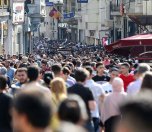Click to read the article in Turkish
İstanbul Political Research Center (İstanPol) has released a research report titled, "Insecurity of Youth in Turkey: The Perception of Labor, Subsistence and Life."
Researchers conducted focus group meetings with three groups of young people, one consisting of employees who have a higher education degree and university students, one consisting of people who did not have higher education and mostly do manual labor jobs, and one consisting of those who are neither employed nor studying.
What do they expect?
Regardless of their educational and employment status, young people expect to "have a good job" and their expectations from a good job are "regular working hours, regular salary and right to paid leave."
Because of these expectations, public service jobs are attractive to the youth, the study notes. However, they think that favoritism is a more important factor than competence in employment in the public sector.
While the participants think that the private sector is better in terms of improving themselves, they do not consider it an ideal choice because of "flexible conditions" and long working hours.
Unemployed young people also expect "prestige and be respected" while currently employed people stated that their current working conditions do not meet their expectations.
Professional identities erode
As an aspect of precarious labor, professional identities are eroding, according to the report. It says many young people do not have such an identity, which is based on the harmony between the education one received and the job he/she does. Most of the employees recently changed their jobs, the report further says.
Regardless of their employment status, participants said they have financial difficulties, which forces people to live with their families.
Distrust in politicians
The participants stated that when they had the opportunity, they wanted to live in another country with better working conditions and living standards. Distrust in politicians, uncertainty and favoritism is influential in this, the report states.
While most young people think that current political actors cannot solve Turkey's problems, they think March 2019 local elections, where the ruling Justice and Development Party (AKP) lost İstanbul and the capital Ankara to the opposition, was a breaking point and showed that "things could change." (SO/VK)







